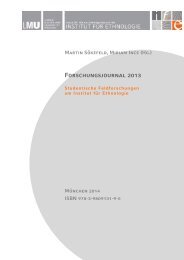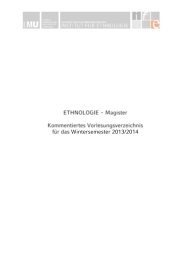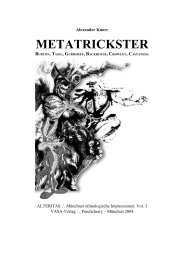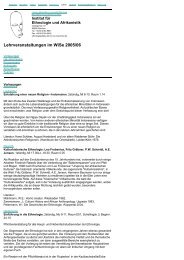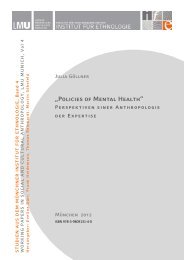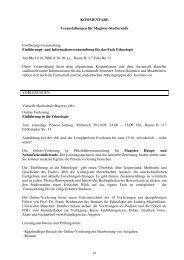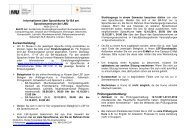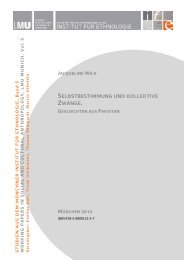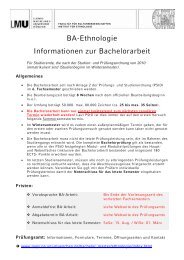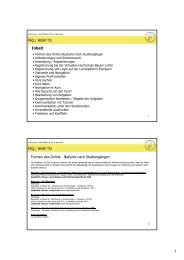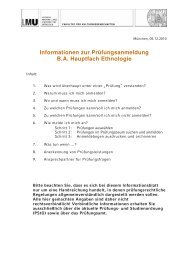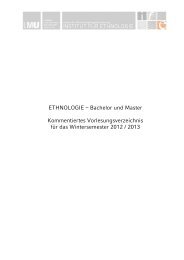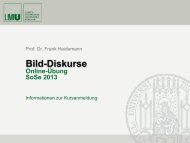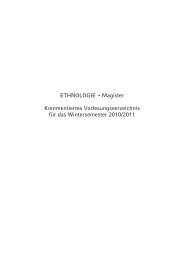newsletter_3_2013 - Ethnologie - LMU
newsletter_3_2013 - Ethnologie - LMU
newsletter_3_2013 - Ethnologie - LMU
Sie wollen auch ein ePaper? Erhöhen Sie die Reichweite Ihrer Titel.
YUMPU macht aus Druck-PDFs automatisch weboptimierte ePaper, die Google liebt.
Schmankerl<br />
leucht. Abschließend diskutiert die Ar-‐<br />
beit mit Bezug auf das Konzept des<br />
Friedensjournalismus und mit einer<br />
theoretischen Fundierung durch Post-‐<br />
koloniale Kritik und Kritische Weiß-‐<br />
seinsforschung, welche Möglichkeiten<br />
einer Neubesetzung von Media Diversi-‐<br />
ty denkbar sind.<br />
Dr. des. Eva Jansen<br />
Naturopathy in South India: Socio-‐<br />
Medical Practices of the (Anti-‐)Clinic<br />
Prof. Dr. Frank Heidemann; Zweitgut-‐<br />
achterin: Prof. Dr. Gabriele Alex, Uni-‐<br />
versität Tübingen<br />
Naturopathy is one of the six medical<br />
systems recognized by AYUSH, a sub-‐<br />
department of the Indian Government.<br />
Its ideology, which encompasses a re-‐<br />
jection of allopathic treatment in all its<br />
forms, is rooted in Gandhi’s vision of<br />
self-‐restraint and political resistance<br />
through non-‐violence and reference to<br />
the local. Gandhi used treatment me-‐<br />
thods and other medical flows imported<br />
from Europe and merged them with<br />
local ideas in order to create a new<br />
health system that implicitly challenged<br />
the biopolitics of the British colonizers.<br />
Due to the the politicized underpinning<br />
of Gandhi's Naturopathy, the anthropo-‐<br />
logical discourse has referred to Natu-‐<br />
ropathy as the anti-‐clinic, which stands<br />
in clear opposition to all other medical<br />
practices. Two major forms of Naturo-‐<br />
pathy have emerged in the last twenty<br />
years in South India: On one side, a<br />
scientific, professional branch models<br />
themselves after allopathic practitio-‐<br />
ners. On the other side, a group of ideo-‐<br />
logists presents themselves as using a<br />
psycho-‐nutritious approach in treating<br />
their patients, grounded in the princi-‐<br />
ples of simplicity, transparency, a criti-‐<br />
que of globalization, and a focus on pa-‐<br />
tient empowerment. This heterogeneity<br />
of naturopathic formations is sharpe-‐<br />
ned and most clearly reflected in the<br />
recent conflicts about government regi-‐<br />
stration of naturopathic practitioners.<br />
Through an examination of the actual<br />
socio-‐medical practices in their hospi-‐<br />
tals, however, it becomes clear that the<br />
differences between professional Natu-‐<br />
ropaths and psycho-‐nutritionals only<br />
exist in nuances. Indeed, these differen-‐<br />
ce almost dissolve as we begin to trace<br />
the “hierarchization” of hospital wor-‐<br />
kers as well as other inconsistencies<br />
that become evident in the logic of both<br />
groups. In the same manner, the pati-‐<br />
ents of both hospitals do not necessarily<br />
follow the logic of the anti-‐clinic in<br />
their own practices and beliefs. The<br />
idea of empowerment therefore does<br />
not reach those for whom it is targeted.<br />
Accordingly, this dissertation illustrates<br />
the political clash between Naturopaths<br />
in South India from different perspecti-‐<br />
ves, examines socio-‐medical practices<br />
in naturopathic hospitals and discusses<br />
the validity of the term “anti-‐clinic” in<br />
relation to this system and context.<br />
Eva Jansen, Vanessa Marlog und Julia Bayer mit<br />
Doktorvater Frank Heidemann<br />
22



